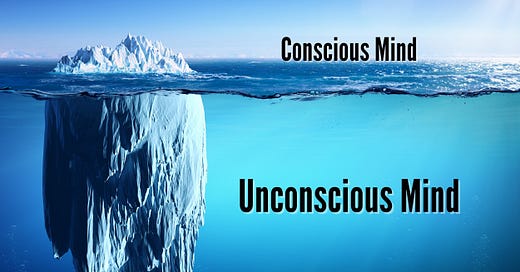The Paradox of Pursuing Happiness: Insights from Depth Psychology
What does it mean to become your true Self?
This is the second in a 3 part series exploring the pursuit of happiness and wellbeing from various wisdom traditions. The first was on Existential Psychology (which also contains the intro to this series), and the next will be on Buddhism.
“We are not here to fit in, be well balanced, or provide exempla for others. We are here to be eccentric, different, perhaps strange, perhaps merely to add our small piece, our little clunky, chunky selves, to the great mosaic of being… we are here to become more and more ourselves.”
― James Hollis, What Matters Most: Living a More Considered Life
Depth Psychology shares much with Existential Psychology in its emphasis on finding a personal sense of meaning in life. But Depth Psychology takes it one step further, arguing that a full life means becoming fully ourselves.
What does it mean to become oneself?
Carl Jung, a major pioneer in the field of Depth Psychology, was fascinated by the unconscious mind. Previous to Jung and Freud, we had a simplistic view of the mind. Through dream exploration and other practices, it became clear that we are multilayered and largely influenced by our unconscious mind.
Central to Jung’s psychology was his idea of individuation, a natural process that begins mid life. Jung differentiates the first and second halves of life, with the first being largely focused on developing an identity to succeed in the world.
As adolescents we explore different social groups and activities, internalizing aspects of these things to form an identity. Our identity often relates to what music we listen to, how we dress, our hobbies and interests, and what we’re good at.
We base our sense of self on the people and interests closest to us. This allows us to connect with others who share our values and helps us feel a sense of belonging in the world.
The second half of life is in direct opposition to the first, where we must release our constructed sense of self to allow the space for a more authentic and unique sense of self to emerge.
“The first half of life is devoted to forming a healthy ego, the second half is going inward and letting go of it.”
-Carl Jung
Jung called this process Individuation, which is really a great word for it. We move from a social and cultural identity to a truly individual sense of self. While in the first half of life we internalize aspects of our environment, in the second half we explore and express the truths which arise from within, individuating ourselves from group identities.
This process is a discovery of our truest and most deeply held values, which in turn inform a new sense of self. Jung called this the Self (often called “the capital ‘S’ Self”), but also referred to it as the Soul.
This is an old idea, dating back to Ancient Greece at least, who had the concept of the daimon, which was seen as our most divine aspect, the part of ourselves that connects us to the Gods. The concept of the daimon also encompasses personal fate and destiny, moral and ethical guidance, and artistic or creative inspiration.
“There's nothing wrong with happiness, but it's not a steady state. It's not a permanent condition, it's a byproduct of being in right relationship to our souls at the time.”
-James Hollis
So how do we cultivate the Self?
I’m making the second half of this article available to paid subscribers only in an attempt to make my writing practice more sustainable and also prioritize it more. I will also raise my yearly subscription price next week, so subscribe now and save.
I’d also like to sincerely thank my paid subscribers, it means so much to me and really helps! :)
Keep reading with a 7-day free trial
Subscribe to Being Integrated to keep reading this post and get 7 days of free access to the full post archives.





